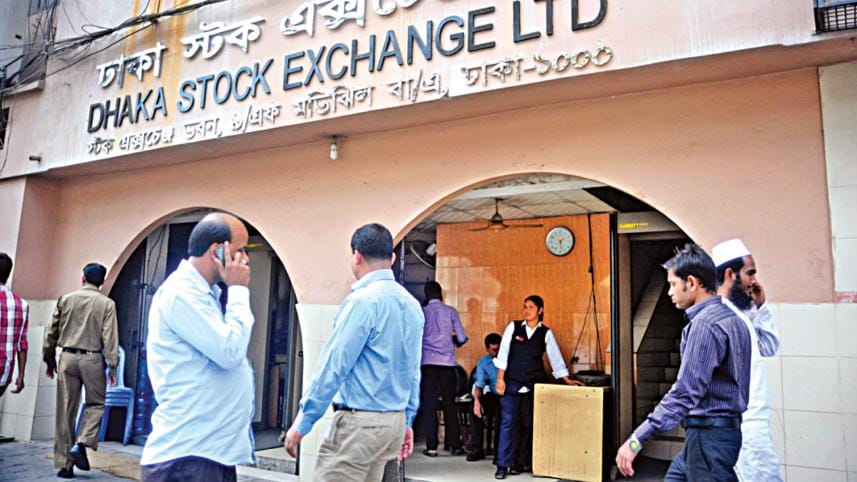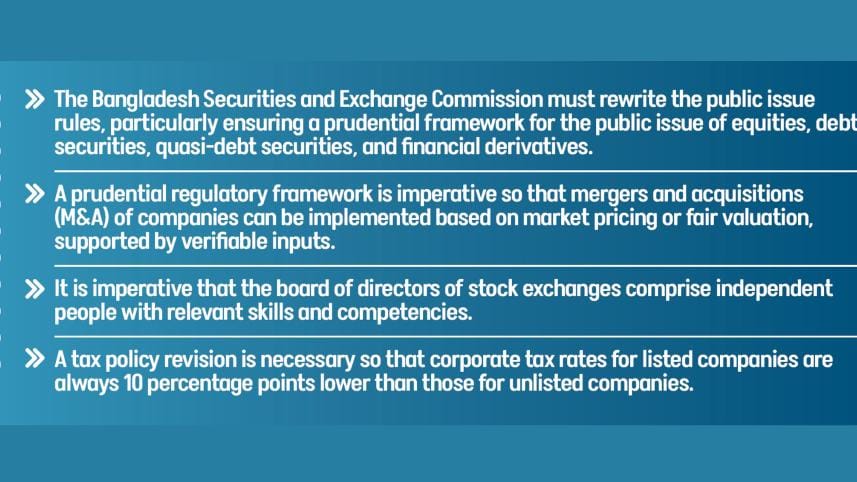A 10-point plan for capital market development

Bangladesh's capital market has long been entrapped in a vicious cycle of underdevelopment. The fact that the annual stock market turnover is less than 5 percent of GDP is a glaring indicator of this. The problems include prohibitive illiquidity of the market, the absence of bond and derivative markets, inefficient regulatory oversight, lack of corporate transparency and good governance, a fragile financial sector burdened with mounting non-performing assets, a worsening balance of payments (BOP) crisis and exchange rate volatility, and an environment of weak protection for investors.
While some problems are macroeconomic and more related to the central bank, others are relevant to the capital market regulator and are believed to be at the core of capital market underdevelopment in Bangladesh. In this short note, I will briefly explain a 10-point plan for capital market development in Bangladesh.
1) The Bangladesh Securities and Exchange Commission (BSEC), as the primary capital market regulator, must commit to ensuring free market arbitrage. This means that the regulator shall never impose price controls (neither floors nor caps), thereby restricting free and fair trading in securities in any organised stock exchange.
Free market arbitrage is a precondition for an efficient capital market. We observed that the regulator, in the face of market volatility, imposed artificial price control measures, directly impeding free arbitrage in securities. Every time such price controls were implemented, they caused long-term market illiquidity and harmed the interests of investors and capital market intermediaries. Such anti-market measures were often politically motivated and instigated by various misguided government agencies.

2) The BSEC must rewrite the public issue rules, particularly ensuring a prudential framework for the public issue of equities, debt securities, quasi-debt securities, and financial derivatives. The public issue rules should require no fixed pricing of securities at face values, no opaque private placements without the exchange of fair considerations, and a minimum of 25 percent float. Any issue of debt securities should also undergo the standard process of public subscription, fair pricing, active trading on stock exchanges, and mandatory redemption at the end of tenors.
The approval process must be based on a few verifiable and highly relevant financial metrics. These include turnover, earnings before interest, taxes, depreciation, and amortisation (EBITDA), earnings before interest and taxes (EBIT), net profit after taxes (NPAT), cash flow from operations, free cash flows, and a history of capital structure prior to the IPO application. No securities should be allowed to be listed unless the issuer company is complying with basic corporate governance regulations concerning the independence and integrity of corporate boards and board committees.
The functioning of the audit committee and the nomination and remuneration committee (NRC) is weak and unregulated. The extent of family control must be reduced in the board of directors of any company listed with stock exchanges. The accounting and reporting of related party transactions is an area requiring enhanced oversight. The regulator should commit to discovering the fair value of securities to be listed with the stock exchanges. Unless and until entrepreneurs are guaranteed a fair valuation of their corporations, no well-governed business enterprise will voluntarily choose to be listed with the stock exchanges and be subject to enhanced compliance costs. The role of stock exchanges should be primary in the process of listing securities. And the role of the regulator should be solely regulatory, not operational.

3) The capital market in Bangladesh is incomplete and underdeveloped. It is mostly an equity-based market with no secondary market for trading in corporate bonds and financial derivatives. An amendment to securities laws is required to allow for on-market share buybacks and executive compensation schemes in stocks and warrants, subject to prudential regulation and real-time disclosure. On-market share buyback regulation will act as an automatic stabiliser for the capital market.
Executive compensation based on stock options and warrants will mitigate agency conflicts.
It is simply said that after 53 years of independence, the securities regulator and stock exchanges have yet failed to introduce basic options for trading on the stock exchanges. A DSE-30 index option and standard option contracts can be introduced with reference to the blue-chip stocks listed with the stock exchanges. A number of top brokers can be entrusted with the job of market-making for this purpose. The fear that investors will be exposed to risky leveraged positions in options is unwarranted. Instead, this new market segment in option contracts will significantly improve market dynamics, price discovery, and market liquidity.
4) A prudential regulatory framework is imperative so that mergers and acquisitions (M&A) of companies can be implemented based on market pricing or fair valuation, supported by verifiable inputs. Any listed company should be open for acquisition by another company, either for strategic reasons or to gain an advantage in ongoing markets. Of course, an M&A should be subject to competition rules, compliance with exchange regulations, other securities laws, and ultimately the approval of the courts. A substantial acquisition of shares of a listed company by any foreign entity (or entities under their control) should be subject to instantaneous disclosure and certain other conditions.

5) The role of institutional investors, including brokers, merchant bankers, and asset management companies, is dysfunctional in the active capital management of companies. Trading rules need to be redefined so that institutional investors can easily acquire (or exit from) substantial shareholdings in listed companies. The institutional role of brokers to tap retail investors in the primary market must be expanded. The objective is to push corporations away from banks and towards the capital market for long-term financing.
The performance of the asset management industry is frustrating for investors. The return from fixed-income instruments such as government securities and term deposits with banks and financial institutions has consistently exceeded long-term returns from mutual funds and other collective investment schemes in Bangladesh. This problem is genuine and a barrier to attracting high-net-worth individuals and institutional investors to the capital market.
6) Enquire, investigate, and prosecute material market manipulations and financial crimes across listed companies, broker companies, merchant banks, asset management companies, and stock exchanges in order to protect the interests of investors. The potential costs of manipulative stock trading must outweigh the potential benefits. The external auditing of financial statements of listed securities is effectively very little regulated. While the Financial Reporting Council (FRC) needs to enforce prudential standards for improving auditing practices, BSEC is obliged to enforce securities laws against material audit failures for listed securities.

7) A high-level inter-regulatory coordination mechanism is necessary so that the capital market regulator can enforce differential reporting and governance regulations for listed companies and capital market intermediaries. Specifically, Bangladesh Bank is the primary regulator of banks and financial institutions, and many of their accounting, financial reporting, and government disclosures are non-standard and conflict with IFRSs and global best practices.
We have observed that the Bangladesh Bank and BSEC have fundamental divergence in their regulatory frameworks regarding financial and governance reporting.
This divergence is detrimental to transparency and accountability in the financial sector. An agreement is needed that listing with a stock exchange shall be subject to differential regulations. A high-level inter-regulatory coordination framework should work to reconcile regulatory differences.
8) Two stock exchanges currently operate in Bangladesh. Their boards of directors, after the demutualisation of the exchanges, have not met market expectations. Critics often complain that the majority of independent non-executive directors lack relevant knowledge about finance, accounting, and capital markets. It is imperative that the board of directors of stock exchanges comprise independent people with relevant skills and competencies. The current stock exchange boards are often dysfunctional due to their irrelevance for the oversight of stock exchanges. The existing board and administrative regulations of stock exchanges are substandard and need to be amended.
9) A real-time platform for corporate reporting and market disclosure is long overdue for seamless corporate regulatory filing by listed companies, brokers, asset management companies, merchant bankers, and other capital market intermediaries. A centralised Extensible Business Reporting Language (XBRL) Bangladesh, a not-for-profit but fiscally sustainable company, may revolutionise regulatory filings of capital market intermediaries. Such a technology platform will substantially reduce manual processing of paperwork across regulatory agencies. An XBRL platform may evolve into a centralised corporate information system where hundreds of thousands of business enterprises file their corporate information online to be seamlessly retrieved by different regulatory authorities according to their differential reporting regulations.
10) A tax policy revision is necessary so that corporate tax rates for listed companies are always 10 percentage points lower than those for unlisted companies. The option to be listed with stock exchanges involves rising compliance costs, and companies need to be compensated by tax savings. The corporate tax regime is biased against listing with stock exchanges. The actual tax burden of an unlisted company is believed to be substantially lower than that of a listed company.
One explanation for this widening divergence is the presumptive and discretionary nature of taxation of corporate turnover and profits by tax authorities. Corporate taxation is often done without reliable books of accounts or proper accounting and auditing of financial statements. The corporate tax code in Bangladesh significantly diverges from accounting recognition and measurement principles as stipulated by the International Financial Reporting Standards (IFRSs).




 For all latest news, follow The Daily Star's Google News channel.
For all latest news, follow The Daily Star's Google News channel.
Comments